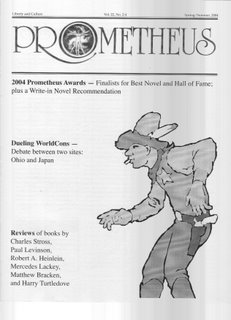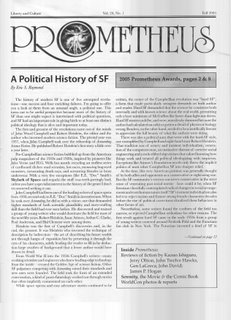A couple of people have mentioned the lack of RSS on this blog. Today I attempt to remedy this deficiency. I moved to Blogger Beta, enabled site feed options, and added the link for readers to subscribe to this blog. If you try this out, please let me know if it works, or if nothing happens. I confess to having tried out RSS months ago, but it didn’t seem to be simple at that time, or perhaps I lacked the patience to follow all the necessary steps.
Category: Uncategorized (Page 12 of 35)
Back from four days at World Fantasy Con in Austin, Texas. No email or internet activity for the duration of my stay. Bought a few too many books, lusted for several others just too pricey for me at the moment, and generally tried to relax. I’m not a gregarious person, and knew very people, so I spent most of my time in the dealers’ room. Drove around Austin for a while as well, and much has changed since I moved away five years ago. I sat in on a few panels, but found only one worthwhile. I’ve attended a handful of WorldCons, one DragonCon, half a dozen local Austin cons — ArmadilloCon — but this was my worst sf con experience in 18 years. Maybe it’s typical for WFC. I don’t know. The panel track was anemic and poorly organized. On one panel an individual said a total of ten words and wondered out loud why the hell he was there to begin with, and often the moderators struggled for direction. Only panel I enjoyed included Tim Powers and a well-spoken David Drake.
Anyway, I achieved my main goal for attending, and that was to meet F. Paul Wilson in person and get my FPW hardcover books autographed. I hauled a huge bag full of 20+ hardcovers to the one, big signing on Friday night, and he signed them all. I guess next time I’ll bring all my anthologies and paperbacks, otherwise I would have needed a cart to haul them around. I also got my more recent Tim Powers acquisitions signed, including three versions of the same book. There were other writers there whose books I could have gotten signed, but there was a limit to how much I could carry. The dealers room seems small, though full of modern and rare works. It’s staggering to see the prices on some of the older books, even from a couple of decades ago. I saw none of these sell while there, so I wonder how the dealers make money. I did see a lot of current books being bought, but at least one table kept marking down stuff more and more each day.
Now, if only those Clark Ashton Smith books from Arkham House weren’t so damned expensive…
With the 50th anniversary of the Hungarian uprising against Soviet rule, a review essay in the New York Times on three books detailing events in 1956. Of interest is the reation and inaction of the American government at the time, and the bungled CIA analysis. It’s amazing that spy agencies currently get $45 billion a year, and have learned nothing.
I’m currently re-reading a classic work of fiction, Sinclair Lewis’ 1935 novel, It Can’t Happen Here. Now possibly out of print (although the NAL edition from 2055 seems available at Amazon), the book deals with the rise of fascism in America in the 1930s, propelled by a populist senator who runs for president. The senator’s supporters include the fictional Bishop Prang, who holds forth from his own radio station preaching a raging form of national socialism no different from that found in Germany and Italy at the time. Yet along for the ride is the whole spectrum of the American public and every vocation in the land. Only a few stand against this tide of boorish, brutish, collectivist ideology.
My own copy I bought in 1986 at a used bookstore in Bergen, Norway, for the princely sum of 60 kroner. As I had no money at the time, those $10 meant a lot to me. Sadly, I remember little of the book, for as I read it now I am struck with the lucid prose and Cassandra-like warnings in the book. Lewis, from what I have read, seems both critical of capitalism and socialism (as they were seen back then), and became the first American to win the Nobel Prize in literature (1930).
An old post from Tyler Cowen about this strange link. The comments make for interesting reading. Join the debate..
It never fails. The newsletter is 99% done, and then I have to spend two weeks taking full care of a six-month old and four-year old as my spouse is off defending a client in a law-suit. I don’t think I ever appreciated the amount of work that single parents shoulder every day, especially when it comes to very small kids. Far from having any time to complete the newsletter, I ended up every day mentally and physically exhausted. But now, the issue has been delivered to the printer, and in a few days should be in the mail to members and subscribers.
I’ve already listed the contents in a previous entry, and I’ve started work on the January 2007 issue as well. I ordered three CDs from the Atlanta Radio Theatre Company, all Heinlein adaptations, to review as a package deal. I know there’ll be at least one more order soon, as I believe they’re adapting A.E. van Vogt’s “The Weapon Shops of Isher.” I’m also laying the groundwork for my strangest review yet, a 14-line sonnet on Sinclair Lewis’s novel, It Can’t Happen Here. I read the book once in 1986 (I believe the book is the first British edition from 1936, or it may be an imprint from that edition). The reason for this format, and the title of the sonnet, derive from my literary hero, John Keats, and a poem he wrote on re-reading King Lear. It’s vanity, I know, but I’ve had this idea in my mind for several years, and I finally dug up my copy of the book and started to read it and jot down notes. I haven’t written poetry in many years, so who knows how it turns out.
Other items scheduled for review include Justina Robson’s Mappa Mundi, and a few other books from my review copies shelf. I’m currently reading Brad Linaweaver’s political broadside, so again there will be some non-fiction reviews in the newsletter.
If you’re reading this and have any reviews of article you’d like to see in print, please send me an email at editor@lfs.org.
Orhan Pamuk, a Turkish writer who does not shy away from confronting the Turkish government, won the 2006 Nobel Prize in literature. Much has been made recently of non-Western writers daring to critique their own culture, such as Naguib Mafouz, Salman Rushdie, Parviz Parvizian, Elif Shafak, and many, many more. The pen is as feared as the sword, even relatively calm works are excoriated without being read, subjected to the “the tics and manias of obscurantism.”
The graphic novel, that is. In case you didn’t shell out cash for the excellent print version, as of Oct 4, Big Head Press is serializing L. Neil Smith’s novel (drawn by Scott Bieser) online for free.
Douglas Rushkoff posts distressing news about the great Robert Anton Wilson, author of many brilliant books including the Illuminatus! trilogy. I corresponded briefly with Wilson ten years ago and was impressed with his kindness, wit, and intelligence.
My vision of Prometheus as a newsletter features cool cover art with cutting edge articles and reviews within. I don’t always get artwork for the cover, and as you can see from these three samples sometimes the newsletter leads off with the article on the front page.

When L. Neil Smith’s novel, The Probability Broach was published as a graphic novel in early 2005, I immediately asked Neil and artist Scott Bieser for permission to reprint some of the art in the issue. They agreed, and so I took advantage or their generosity. The last page of the newsletter contains a small frame of the delectable DJ Thorens, and I wrote a review of the graphic novel version. I’ve now actually bought more graphic novels since 2004 than between 1990 and 2004, but I can still count them on two hands. My personal opinion is that the graaphic novel version of TPB should have been a best novel nominee, but instead the book won as a Special Award. It probably would not have won as a novel, since it already won back in 1982.

The issue with the gunslinger and was inspired by the two articles for each WorldCon site. This issue almost never appeared in print. In 2004 there was a transition in editorship for the newsletter, and this issue was sent to members in two emails. this was around the time I thought about volunteering to help edit the issue, and so I created a sample newsletter to sort of see if I actually could put together an issue again. I had already moved from OS 9 on the Mac to OS X, and my PageMaker software no longer ran native. So, I upgraded to InDesign 2, and threw together an issue and learned a few things about the software. I never released this issue to anyone, and almost lost all the electronic bits in a hardware crash. When I recovered the drive and after I already had put out a couple of issues, I redisovered this 2004 print version, and decided to release it as a special issue.

And here is a plain, almost vanilla cover. A few of the most recent issues have gone 16-20 pages, and with page real estate in these issues at a premium I decided to skip creating a distinctive cover. The current issue again features artwork on the cover, but I’ll hold off on posting this until after the issue is published, some time in mid-October. The issues shown on this page are all available for $3 (just send me an email for details), or you can join LFS and receive each forthcoming issue per year of your membership. A few years ago I had several complete sets of all the back issues of Prometheus, but now there are quite a few that I lack, especially for issues prior to 2004. If anyone knows how to scan pages into PDF, please let me know and I can start the process to put all the back issues online at some point.
By the way, I’m always looking for articles and reviews for the newsletter. Please contact me for details.
As a preview, here’s what’s in store for members and subscribers in the Fall 2006 issue:
Inside Prometheus:
Prometheus Award winners’ remarks from David Lloyd, Patrick Nielsen Hayden (editor), and Ken MacLeod
WorldCon Report by Fred Curtis Moulton with photos of the event
A brief review of the movie version of V for Vendetta
Fiction reviews:
F. Paul Wilson’s The Keep: The Graphic Novel
Gary Bennett’s The Star Sailors, a 1982 novel recently available again
Keith Brooke’s Genetopia
David Louis Edelman’s Infoquake
A trio of Naomi Novik books reviewed
Ian MacDonald The River of Gods
Chris Roberson’s Paragaea
David Lloyd’s Kickback